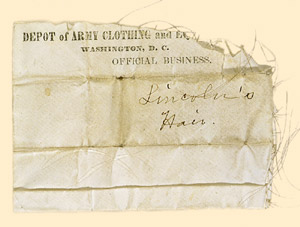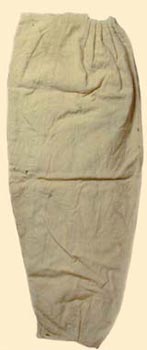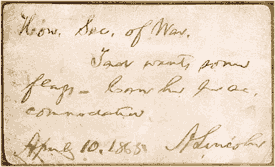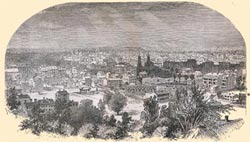
My late husband Wm. Brearley was disbursing clerk in the Quarter Masters Office at the time of President Lincoln's assassination and was also present at the autopsy. When the shirts were taken of [sic] they were thrown on the floor and like others he wanted a relic. So he cut off one sleeve with his pen knife it is the left sleeve... the hair he also cut off himself.
Respectfully, Mrs. Sarah L. Brearley
William Brearley himself had written Gunther in 1890 hoping to sell his Lincoln relics. Mr. Whitehand may have been a dealer or agent working on Brearley's widow's behalf.
In addition to the sleeve and hair, Gunther acquired relics from Whitehand that William Brearley described as the flag that covered Lincoln's coffin when it was removed from the Petersen's boarding house, a padded hood worn by imprisoned conspirator Lewis Paine, and a Lincoln autograph card.
Quarter Masters were responsible for providing clothing, equipment, and transportation for Civil War troops. Although initial efforts to supply the Union army were chaotic, northern industrial production eventually ensured well-fed and supplied troops, significantly contributing to the war effort. The Quarter Master Bureau standardized incremental uniform measurements for factories supplying the troops, introducing the concept of "sizes" that was applied to the ready-made clothing industry after the war. (MCPHERSON 324)

The autograph card informed Secretary of War Edwin Stanton that "Tad wants some flags." The president's son Tad purportedly carried the card to the U.S. Army's military storekeeper as Washington celebrated the war's end on April 10, 1865. The reply on the back of the card read:
Let the bearer have four flags for the Prest's House E.M.S.



